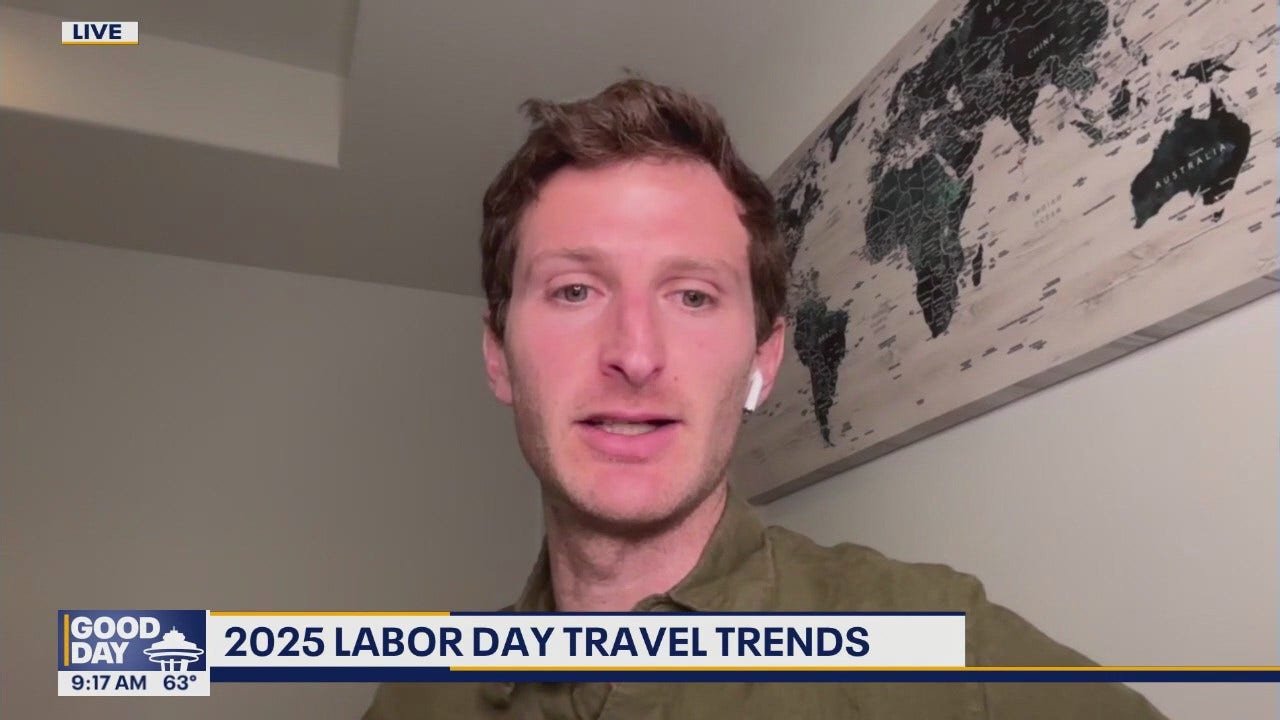Travel Trends
2025 Labor Day travel trends – FOX 13 Seattle

2025 Labor Day travel trends FOX 13 Seattle
Source link
Travel Trends
A New Era for Sustainable and Immersive Tourism

The global tourism industry is undergoing a seismic shift, driven by a confluence of technological innovation, environmental consciousness, and a deepening appetite for culturally rich experiences. At the forefront of this transformation is Trip.com Group, whose 2025 Tourism Innovation Awards have spotlighted projects that redefine travel as a force for sustainability, creativity, and cultural preservation. These awards, which recognize 10 groundbreaking initiatives across Asia, the Middle East, and Europe, are not merely accolades—they are blueprints for the future of travel and a signal to investors of the sectors poised for exponential growth.
The Triple Pillars of Modern Tourism: Immersion, Sustainability, and Culture
The 2025 Tourism Innovation Awards underscore three dominant trends reshaping the industry: immersive technology, sustainable infrastructure, and cultural authenticity. Projects like Saudi Arabia’s Shebara Resort, with its floating sphere villas powered by solar energy and reversible construction, exemplify how luxury and environmental stewardship can coexist. Similarly, teamLab Borderless in Tokyo reimagines art as an interactive, boundary-defying experience, while London’s Harry Potter-themed King’s Cross Station merges nostalgia with cutting-edge storytelling. These projects are not isolated experiments but scalable models that align with a $11.39 trillion projected global sustainable tourism market by 2034.
Investors should note that these trends are not speculative. The awards’ evaluation framework—prioritizing innovation, sustainability, and scalability—has already demonstrated tangible impact. For instance, the top 10 winners saw an average 51% increase in destination orders and a 42% rise in search volume within three months of launch. This data underscores the growing consumer demand for travel that is both transformative and responsible.
Technology as the Catalyst: AI, VR/AR, and Hyper-Personalization
Trip.com Group’s strategic investments in AI-driven personalization are a linchpin of its innovation strategy. Tools like TripGenie and Trip.Best leverage artificial intelligence to curate real-time itineraries, while VR/AR platforms enable virtual previews of destinations, reducing the environmental footprint of exploratory travel. These technologies are not just enhancing user experience—they are redefining the economics of travel.
Consider the financial metrics: Trip.com’s AI-powered tools drove a 200% surge in usage in 2024, with 58% of travelers already relying on AI for recommendations. The company’s R&D spending increased by 13% year-over-year in Q1 2025, reflecting a commitment to scalable technologies that reduce per-user acquisition costs. For investors, this signals a shift toward a travel ecosystem where data-driven personalization and immersive tech are not optional but essential.
Sustainable Tourism: From Niche to Mainstream
The awards also highlight a critical pivot toward sustainability. Shebara Resort’s energy recycling systems and DesertxAlUla’s art-nature fusion are emblematic of a broader industry trend: travelers now demand that their experiences align with their values. Trip.com’s carbon transparency tools, which quantify emissions across flights and car rentals, have already driven 100 million sustainable travel orders in 2024—a 34% year-over-year increase.
This shift is not just ethical; it is economic. The Asia-Pacific sustainable tourism market, growing at a 15% CAGR, is projected to reach $42 billion by 2030. Trip.com’s Country Retreat Programme, which expanded to 34 destinations in 2025, has created 40,000 indirect jobs and boosted local incomes by $5,500 per capita in regions like Bali and Costa Rica. Such initiatives align with the UN’s Sustainable Development Goals while generating long-term value for stakeholders.
Cultural Immersion: The New Travel Checklist
Cultural heritage is another cornerstone of the 2025 awards. Projects like Egypt’s Grand Egyptian Museum, with its 100,000 artifacts and holographic technology, and Japan’s Nintendo Museum, which blends gaming history with interactive exhibits, cater to a generation of travelers seeking authenticity. These experiences are not passive—they are participatory, fostering deeper connections between visitors and destinations.
For investors, the cultural tourism sector offers a dual opportunity: preserving heritage while monetizing it. The Grand Egyptian Museum, for example, has become a major attraction within months of opening, demonstrating the commercial viability of culturally rich projects. As 70% of Gen Z and Millennials prioritize unique, unexplored experiences, the demand for such offerings will only intensify.
Investment Opportunities: Where to Allocate Capital
The convergence of these trends creates a roadmap for investors. Key areas to consider include:
1. AI-Driven Travel Platforms: Companies developing hyper-personalized itineraries and real-time language tools.
2. Sustainable Infrastructure: Firms specializing in eco-friendly construction, renewable energy integration, and carbon offset programs.
3. Immersive Tech Providers: Developers of VR/AR solutions for virtual travel previews and interactive cultural experiences.
4. Cultural Heritage Projects: Partnerships with destinations that blend historical preservation with modern innovation.
Trip.com Group’s $100 million Tourism Innovation Fund and its 31% EBITDA margin in Q1 2025 position it as a prime beneficiary of these trends. However, investors should also look beyond the platform to niche players in AI, green energy, and cultural tourism. For example, the rise of “last-chance tourism” to endangered destinations could drive demand for conservation-focused travel startups.
Conclusion: The Future of Travel is Here
Trip.com Group’s 2025 Tourism Innovation Awards are more than a celebration—they are a harbinger of the industry’s next phase. As immersive tech, sustainability, and cultural authenticity converge, the travel sector is evolving from a commodity-driven model to a value-driven one. For investors, this means opportunities in sectors that align with both planetary and consumer priorities. The winners of these awards are not just redefining destinations; they are redefining the very purpose of travel.
The time to act is now. With the Asia-Pacific sustainable tourism market growing at 15% annually and AI adoption in travel set to accelerate, the next decade will belong to those who invest in the future of experiential travel.
Travel Trends
Aruba’s VTO Program Sparks Global Voluntourism Momentum, Blending Responsible Travel with Community Service to Redefine Tourism in Caribbean, Following the Trends Set by Thailand, Nepal, South Africa: Here’s All You Must Know

Wednesday, August 6, 2025
As global travelers increasingly seek meaningful, responsible tourism experiences, Aruba’s new Volunteer Time Off (VTO) initiative is setting a benchmark for voluntourism—a hybrid form of travel that combines leisure with community-focused activities. More than just a promotional campaign, Aruba’s VTO program is a reflection of a broader global shift where travelers are prioritizing purpose over pleasure, sustainability over spectacle, and connection over consumption.
Launched by the Aruba Tourism Authority in 2025, the VTO program aligns with the rise of corporate social responsibility in tourism, where travelers are encouraged to use their company-sanctioned VTO days not just to unwind, but to give back to the destinations they visit. Through curated partnerships with local resorts and environmental groups, visitors to Aruba now have the opportunity to contribute to environmental conservation, animal welfare, and cultural preservation efforts while enjoying the island’s natural beauty.
This movement is more than a passing trend—it signals a transformative shift in global travel behavior, one that could reframe the very fabric of tourism economics in the post-pandemic era.
Why Voluntourism Is Gaining Ground Globally
The concept of voluntourism is not new, but recent world events, such as the global climate crisis, rising awareness of sustainable development goals (SDGs), and increased conscious consumerism, have accelerated its relevance. A growing number of travelers now view vacation time as an opportunity to create lasting impact—both personal and communal.
In the case of Aruba, the VTO initiative connects travelers with hands-on activities like beach cleanups, marine conservation, donkey sanctuary assistance, coral restoration, and eco-education at local sanctuaries. These programs are woven seamlessly into the island’s hospitality offerings. Participating resorts, including well-known names like Hyatt, Hilton, and Radisson Blu, now offer “impact-inclusive” stays, combining luxury accommodations with volunteer packages.
This approach not only elevates the visitor experience but creates a tangible benefit for the host community. As the demand for more ethical travel options grows, Aruba’s model offers a scalable and replicable blueprint for other destinations seeking to balance tourism growth with environmental and social responsibility.
A New Era of Responsible Travel: Trends and Impact
With global tourism rebounding in 2024 and expected to reach over 1.5 billion international travelers by the end of 2025, the pressure on destinations to manage overtourism and climate impact is intensifying. Voluntourism emerges as a strategic answer—reducing environmental footprint while maximizing positive local engagement.
Aruba’s VTO program strategically positions the island as a conscious Caribbean destination, attracting a demographic of travelers who are:
- Environmentally aware
- Willing to support local economies
- Looking for transformational travel experiences
In return, Aruba receives not just tourist dollars, but active contributions to ecosystem health, heritage protection, and community resilience. This is particularly critical for small island nations that are vulnerable to climate shifts and economic volatility.
For example, marine-focused initiatives like coral restoration at Bucuti & Tara Beach Resort not only engage tourists but serve a dual function of climate adaptation. Coral reefs buffer coastlines and are essential to biodiversity. Every international guest who volunteers contributes directly to protecting these vital marine structures.
Parallel Voluntourism Models Around the World
Aruba’s VTO initiative is not an isolated case. It is part of a growing wave of voluntourism programs reshaping travel in various regions:
Thailand: Elephant Nature Park in Chiang Mai
Travelers participate in caring for rescued elephants, learning about conservation while supporting ethical animal tourism.
Costa Rica: Sea Turtle Conservation in Tortuguero
Volunteers assist in protecting endangered turtle nests from poachers and climate impact, blending eco-tourism with direct conservation.
Nepal: Village Reconstruction Programs Post-Earthquake
Since the 2015 earthquakes, Nepal has welcomed volunteers into community rebuilding projects—linking humanitarian aid with cultural immersion.
South Africa: Marine and Wildlife Conservation
Organizations near Port Elizabeth and Cape Town offer combined programs where travelers can engage in wildlife protection and environmental education.
These initiatives share a similar ethos: responsible travel, cultural immersion, and environmental stewardship.
What sets Aruba’s VTO program apart is its integration into mainstream tourism packages. Rather than existing on the periphery of adventure travel, it is fully embedded within the island’s core travel infrastructure, making it accessible, structured, and attractive to a wider audience—including families, corporate travelers, and leisure vacationers.
The Tourism Industry’s Shift Towards Social Impact
Globally, tourism boards and hospitality brands are recognizing the value of aligning tourism with purpose-driven narratives. The United Nations World Tourism Organization (UNWTO) has long advocated for tourism that supports the SDGs, particularly:
- Goal 8: Decent work and economic growth
- Goal 11: Sustainable cities and communities
- Goal 12: Responsible consumption and production
- Goal 13: Climate action
Aruba’s VTO program directly supports these goals by channeling tourist activity into initiatives that foster community empowerment, environmental care, and economic inclusivity.
This model has the potential to reshape destination branding, from being known purely for scenic beauty to becoming a symbol of regenerative travel. This pivot also presents economic resilience, as tourism-dependent destinations diversify their appeal and revenue streams through experience-based, high-engagement offerings.
Tourism Meets CSR: The Role of Employers
One of the most innovative aspects of Aruba’s program is how it taps into corporate volunteer programs, encouraging professionals to use paid Volunteer Time Off (VTO) for travel that benefits both personal development and the destination.
Many multinational companies now offer VTO as part of employee wellness and CSR packages, yet a significant portion of employees remain unaware or underutilize this benefit. Aruba’s campaign bridges this gap, encouraging individuals to align their paid leave with purposeful experiences.
This concept holds enormous potential. If scaled globally, even a small percentage of the corporate workforce taking VTO abroad could generate millions of volunteer hours annually in support of tourism communities worldwide.
Voluntourism and the Rise of the Conscious Traveler
Today’s travelers are no longer satisfied with transactional tourism. Instead, they seek experiences that:
- Foster emotional connections
- Build cross-cultural understanding
- Promote sustainability
Voluntourism answers these needs by offering depth, intention, and impact. Aruba’s success could inspire other nations to embrace similar initiatives—not only as a marketing advantage but as a moral imperative in the face of climate change, biodiversity loss, and cultural erosion.
It is also a smart long-term strategy for tourism resilience. Destinations that foster community-inclusive tourism are likely to recover faster from shocks—economic, environmental, or political—because their tourism industry is rooted in local engagement, not extraction.
The Future of Travel: Purpose, Not Just Pleasure
As voluntourism evolves, it will likely take on more diverse forms. Future programs may include:
- Urban volunteering in underserved areas
- Cultural heritage preservation in historic cities
- Disaster response partnerships between travelers and NGOs
- Climate education tours that blend science with travel
Aruba’s VTO program may only be the beginning. What it offers is a clear template for tourism boards and hospitality leaders worldwide: Purposeful travel is not just a niche—it’s the new norm.
Conclusion: Travel That Leaves a Legacy
Aruba’s VTO program is not merely a tourism campaign. It is a philosophy of travel that invites people to exchange passive consumption for active contribution. It turns the simple act of going on vacation into a mutual relationship between traveler and destination, with benefits that stretch beyond souvenirs and snapshots.
As the world moves toward a more sustainable future, voluntourism represents the ideal intersection of travel and global citizenship. Aruba has taken a bold step forward—and the tourism world is watching.
Travel Trends
From Bleisure to AI-Powered Journeys: The New Era of Chinese Travel Trends

China’s travel market is undergoing a transformation that reflects the country’s evolving social dynamics, technological adoption, and global business ambitions.
Industry data and insights from Tourism Economics, Trip.com Group, and ITB China’s Buyer Circle reveal a market that is no longer defined by a single type of traveler. Instead, it is rapidly fragmenting into diverse segments driven by generational preferences, lifestyle shifts, and new economic opportunities.
For international destinations and travel service providers, these shifts present both challenges and lucrative opportunities. From the rise of “bleisure” travel to the acceleration of AI-driven services and the growing participation of senior travelers, the Chinese travel ecosystem is signaling a new era where personalization, value creation, and cultural immersion take center stage.
Outbound Travel: Younger Explorers and Active Seniors Take the Lead
Trip.com Group data shows that travelers born in the 1980s and 1990s continue to dominate China’s outbound travel, representing 67% of this segment in 2024. These digital-savvy adventurers are shaping demand with a preference for independent itineraries, lifestyle-driven trips, and non-traditional destinations. At the same time, a powerful wave of senior travelers is emerging. By the end of 2025, more than 100 million “active seniors” are expected to participate in outbound travel, with the market projected to exceed RMB 1 trillion (USD 140 billion).
This dual growth signals a potential divergence in outbound travel behavior. While younger travelers are drawn to flexible, tech-enabled, and immersive experiences, senior travelers prioritize comfort, accessibility, and culturally enriching journeys. Travel brands will need to design products that cater to both ends of this demographic spectrum, balancing innovation with inclusivity.
Personalization and Non-Traditional Destinations Drive Growth
Chinese travelers are moving beyond checklist-style sightseeing. According to the ITB China Buyer Survey, 82% of respondents already offer customized destination programs to meet demand for emotionally resonant and culturally grounded travel. However, structured group travel still maintains a foothold, with 48% of travel agents selling seat-in or small-group destination tours.
This evolution is prompting the development of hybrid travel models that blend independence with logistical support. High-spending travelers are particularly willing to pay a premium for unique, non-traditional experiences that promise authenticity without sacrificing comfort. The challenge for travel providers lies in scaling these offerings while maintaining the quality and cultural depth that discerning travelers expect.
Bleisure and MICE: Business Travel Redefined
Chinese enterprises expanding abroad are fueling growth in Meetings, Incentives, Conferences, and Exhibitions (MICE) tourism. According to the ITB China Buyer Survey, 83% of respondents identified “business + leisure” (bleisure) as a key growth opportunity. Corporate clients increasingly seek travel solutions that combine productivity with relaxation, emphasizing employee well-being, engagement, and brand storytelling.
This shift is transforming MICE tourism from a cost-focused activity into a value-driven growth engine. Destinations that can offer flexible leisure extensions, authentic cultural experiences, and excellent connectivity will stand out in the competitive global market for corporate travel.
Technology and Policy Fuel High-Quality Travel Growth
AI adoption is accelerating across China’s travel industry. More than half of surveyed ITB China Buyer Circle members report using AI tools for product recommendations, customer service, and market analysis. This trend is reshaping the travel value chain, enabling greater personalization, dynamic pricing, and automated services.
At the same time, supportive policies—ranging from visa facilitation to digital payment expansion—are reducing barriers to both inbound and outbound travel. As air connectivity continues to rebuild, travel companies that combine technology with human-centered service are likely to capture the next phase of market growth.
Inbound Tourism: China’s Global Appeal Strengthens
China is also becoming more attractive to international travelers. Tourism Economics projects that the country’s share of global inbound overnights will continue to grow as its cities deepen their product offerings and service readiness. Demand for free independent travel (FIT) is rising, social media increasingly shapes trip planning, and non-traditional destinations across China are attracting more attention from global tourists.
For inbound providers, adapting to this shift requires more than traditional landmark promotion. International travelers now seek immersive, lifestyle-led experiences that reflect local culture and authenticity. As this trend accelerates, destinations that innovate in experience design and market to emerging source regions will gain a competitive edge.
China’s travel evolution is no longer just about volume. It is about value, personalization, and strategic alignment with new consumer behaviors. For global travel stakeholders, the message is clear: the next wave of opportunity lies in embracing the diversity, technology, and cultural depth shaping China’s new travel era.
-

 Brand Stories2 weeks ago
Brand Stories2 weeks agoBloom Hotels: A Modern Vision of Hospitality Redefining Travel
-

 Brand Stories2 weeks ago
Brand Stories2 weeks agoCheQin.ai sets a new standard for hotel booking with its AI capabilities: empowering travellers to bargain, choose the best, and book with clarity.
-

 Destinations & Things To Do2 weeks ago
Destinations & Things To Do2 weeks agoUntouched Destinations: Stunning Hidden Gems You Must Visit
-

 Destinations & Things To Do2 weeks ago
Destinations & Things To Do2 weeks agoThis Hidden Beach in India Glows at Night-But Only in One Secret Season
-

 AI in Travel2 weeks ago
AI in Travel2 weeks agoAI Travel Revolution: Must-Have Guide to the Best Experience
-

 Brand Stories1 month ago
Brand Stories1 month agoVoice AI Startup ElevenLabs Plans to Add Hubs Around the World
-

 Brand Stories4 weeks ago
Brand Stories4 weeks agoHow Elon Musk’s rogue Grok chatbot became a cautionary AI tale
-

 Brand Stories2 weeks ago
Brand Stories2 weeks agoContactless Hospitality: Why Remote Management Technology Is Key to Seamless Guest Experiences
-

 Asia Travel Pulse1 month ago
Asia Travel Pulse1 month agoLooking For Adventure In Asia? Here Are 7 Epic Destinations You Need To Experience At Least Once – Zee News
-

 AI in Travel1 month ago
AI in Travel1 month ago‘Will AI take my job?’ A trip to a Beijing fortune-telling bar to see what lies ahead | China


You must be logged in to post a comment Login